
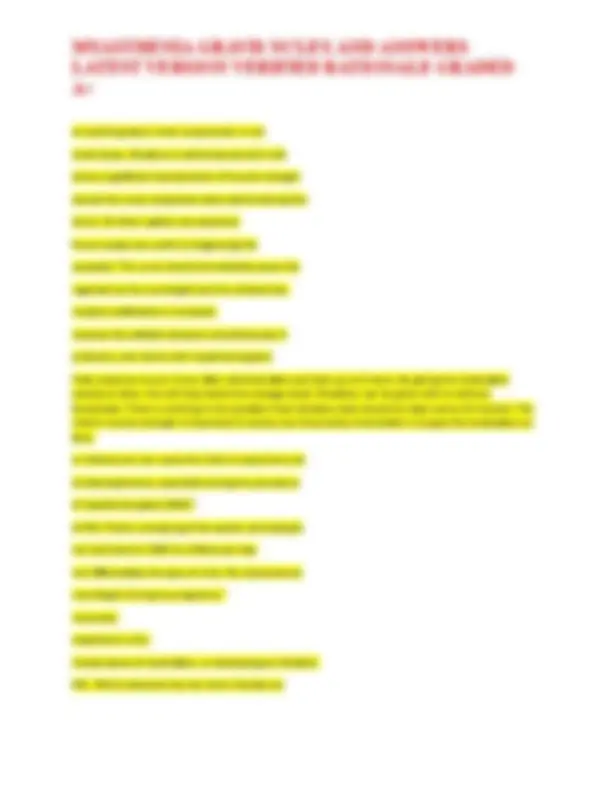
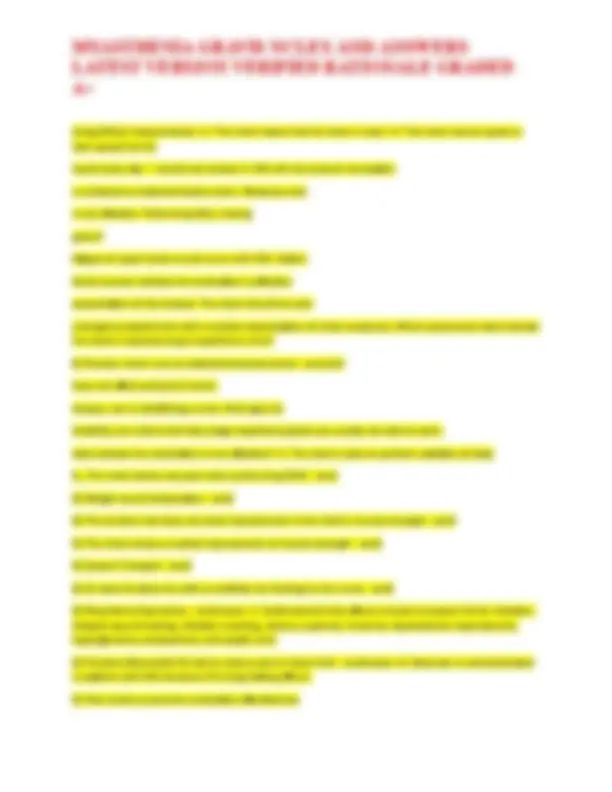
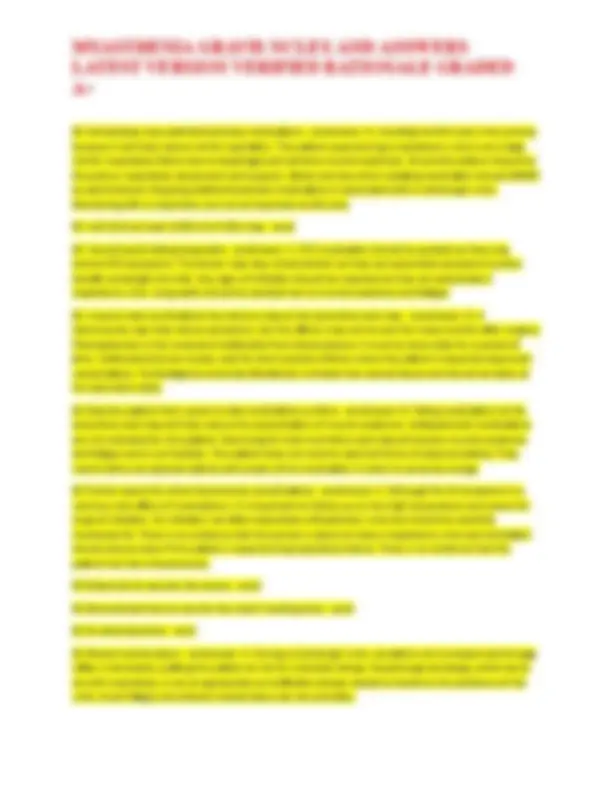
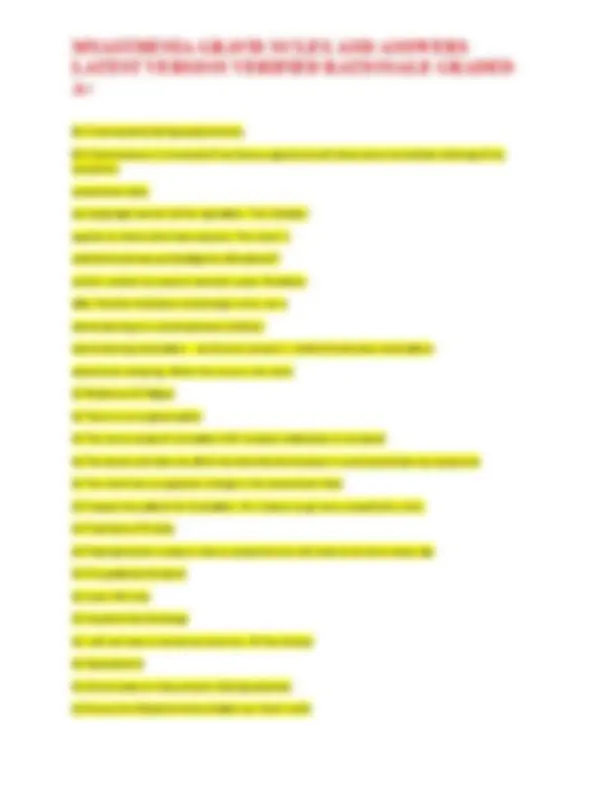
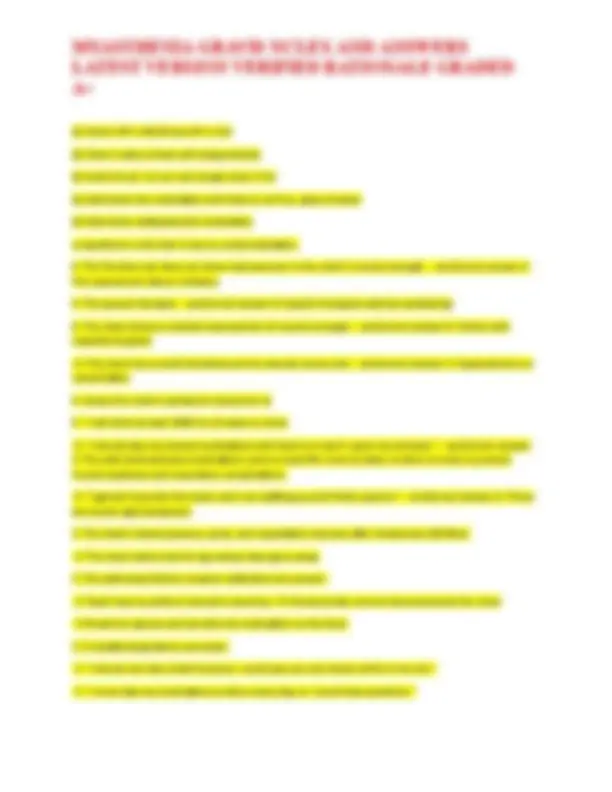
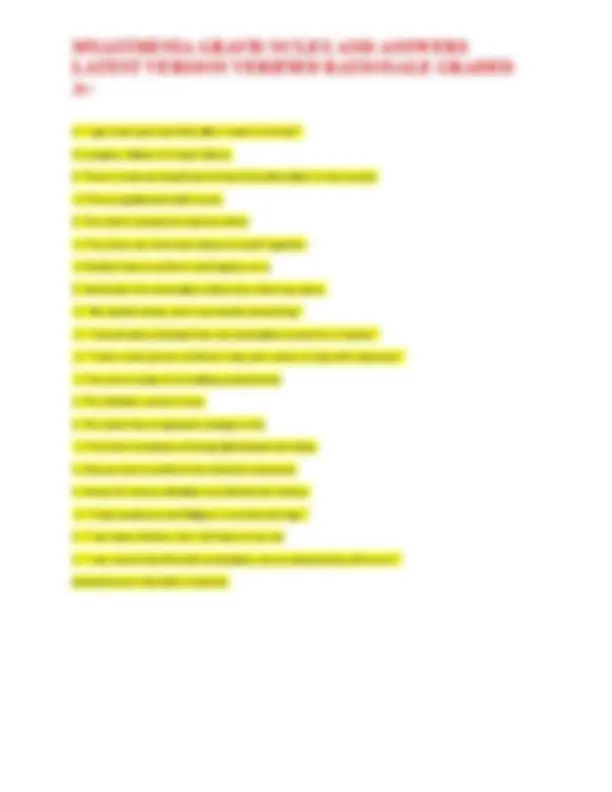


Study with the several resources on Docsity

Earn points by helping other students or get them with a premium plan


Prepare for your exams
Study with the several resources on Docsity

Earn points to download
Earn points by helping other students or get them with a premium plan
Community
Ask the community for help and clear up your study doubts
Discover the best universities in your country according to Docsity users
Free resources
Download our free guides on studying techniques, anxiety management strategies, and thesis advice from Docsity tutors
MYASTHENIA GRAVIS NCLEX AND ANSWERS LATEST VERSION 2025 VERIFIED RATIONALE GRADED A+.pdf
Typology: Exams
1 / 12

This page cannot be seen from the preview
Don't miss anything!







Your patient has just been diagnosed with myasthenia gravis. Which of the following orders should be questioned? Your patient diagnosed with Myasthenia Gravis begins taking Mestinon. During the first week, the dosage is changed frequently. While the dosage is being adjusted, the nurse's priority intervention is to: Young children are ill frequently, and infections You are teaching your patient diagnosed with myasthenia gravis about treatments. Which of the following statements, if made by the patient indicates the need for further teaching? with the client finding a position suited for the Which surgical procdure should the nurse anticipate the client with myasthenia gravis undergoing to help prevent the s/s of the disease process? Which statement by the female client diagnosed w/ MG indicates the client needs more discharge teaching? Which statement by the client supports the diagnosis Which statement by the 20-year-old female client diagnosed with MG indicates the client understands the discharge teaching? Which response to the Tensilon (edrophonium Which referral is appropriate for the client in the late Which of the following would be most likely given as a top nursing diagnosis for a patient experiencing a cholinergic crisis? Which of the following is a side effect of Methylprednisolone (Solu-Medrol)? Which ocular or facial signs/ symptoms should the nurse expect to assess for the client diagnosed with myasthenia gravis? Which collab health care team member should the nurse refer the client to in the late stages of MG? when up to 15% of the blood volume is in the cell understanding of the discharge instructions? These medications are one of the very few that The wife of a client diagnosed with MG is crying and shares with the nurse she just doesn't know what to do. Which response is the best action by the nurse? The patient with myasthenia gravis is complaining about dealing with muscle weakness. Which of the following could the nurse do for this patient?
The patient with myasthenia gravis arrives to the clinic and states that he is experiencing nausea and diarrhea. His blood pressure is 125/85 HR 70 Temp 100.0 R 19 O2 97%. What is the nursing priority? the nurse should administer at the exact scheduled time. Steroids are not prescribed for MG. The nurse is teaching a client about myasthenia gravis. Which statement, if made by the patient indicates the need for further teaching? The nurse is discharging a client diagnosed with the muscles of the eye and eyelid indicate the medication The male client with MG is undergoing plasmapheresis at the bedside. Which assessment data would warrant immediate intervention by the nurse? The male client diagnosed with MG is prescribed the The client w/ MG is undergoing plasmapheresis at the bedside. Which assessment data warrant immediate intervention? The client w/ MG is prescribed the cholinesterase inhibitor neostigmine (Prostigmin). Which data indicate the med is effective? The client w/ MG is admitted to the emergency room with a sudden exacerbation of motor weakness. Which assessment data indicate the client is experiencing cholinergic crisis? The client is experiencing a myasthenic crisis. Which of the following is a priority action of the following ordered actions? The client is diagnosed with MG. Which intervention The client is being evaluated to rule out myasthenia gravis & being administered the Tensilon test. Which response to the test indicates the client has MG? The client diagnosed with MG is being discharged home. Which intervention should the nurse teach the significant other? The client diagnosed with MG is admitted to the The client diagnosed w/ myasthenia gravis is being discharged home. Which intervention has priority when teaching the client's significant others? The client diagnosed w/ MG is admitted w/ an acute exacerbation. Which interventions should the nurse implement? SELECT ALL APPLY. that lasts approximately 5 minutes when Tensilon stages of myasthenia gravis?
living (ADLs) independently. l 2. The client states that his vision is clear. l 3. The client cannot speak or look upward at the liquid every day." - ansCorrect answer 1: MG will not prevent conception is unilateral or bilateral double vision. Weakness and is not effective. Performing ADLs, having gravis? fatigue of upper body muscle occur with MG. Option facial muscles indicate the medication is effective exacerbation of the disease. The client should be seen emergency department with a sudden exacerbation of motor weakness. Which assessment data indicate the client is experiencing a myasthenic crisis? E) Monitor client's serum anticholinesterase levels - ansA,B,D does not affect potassium levels. disease, not in identifying a crisis. Vital signs do disability, but clients with late-stage myasthenia gravis are usually not able to work. data indicate the medication is not effective? l 1. The client is able to perform activities of daily D_ The client denies any pain when performing ROM - ansA D) Weight loss & Dehydration - ansB D) The tensilon test does not show improvement in the client's muscle strength - ansD D) The client shows a marked improvement of muscle strength - ansD D) Speech Therapist - ansD D) Sit down & allow the wife to ventilate her feelings to the nurse - ansD D) Respiratory Depression - ansAnswer: C. Corticosteroid side effects include increased risk for infection, delayed wound healing, infection masking, edema, euphoria, insomnia, hypokalemia, hypocalcemia, hyperglycemia, osteoporosis, and peptic ulcer D) Procaine (Novocain) SQ stat to reduce pain in lower limb - ansAnswer: D. Novocain is contraindicated in patients with MG because of its long lasting effects. D) Plan meals to promote medication effectiveness
D) Immediately stop anticholinesterase medications - ansAnswer: A. Inserting the NG tube is the priority because it will help reduce risk for aspiration. The patient experiencing a myasthenic crisis is at a large risk for respiratory failure due to dysphagia and extreme muscle weakness. All priority actions should be focused on respiratory assessment and support. Ativan and any other sedating medication should NEVER be administered. Stopping anticholinesterase medications is associated with a cholinergic crisis. Monitoring I&O is important, but not as important as NG tube D) I will drink at least 2,500 ml of h20 a day - ansA D) I should avoid taking long walks - ansAnswer: C. OTC medication should be avoided as they may worsen MG symptoms. The doctor may stop a beta blocker as they can exacerbate symptoms (unless benefit outweighs the risk). Any signs of infection should be reported as they can exacerbate a myasthenic crisis. Long walks should be avoided due to muscle weakness and fatigue D) I need to take my Mestinon four times a day at the same time each day. - ansAnswer: B. A thymectomy may help reduce symptoms, but the effects may not be seen for many months after surgery. Plasmapheresis is the removal of antibodies from blood plasma. It must be done daily for a period of time. Corticosteroids are mostly used for short periods of time unless the patient is experiencing ocular complications. Pyridostigmine bromide (Mestinon) is divided into several doses and should be taken at the same time daily. D) Help the patient form a plan to take medications on time - ansAnswer: D. Taking medications at the same time each day will help reduce the exacerbation of muscle weakness. Antispasmodic medications are not indicated for this patient. Exercising for that much time each day will worsen muscle weakness and fatigue and is not feasible. The patient does not need to avoid all forms of physical activity. They need to time out physical activity with peaks of the medication in order to conserve energy. D) Further assess for other thymectomy complications - ansAnswer: C. Although the GI symptoms is a common side effect of medicaitons, it is important to follow up on the high temperature and assess for sings of infection. An infection can often exacerbate a Myasthenic crisis and should be carefully monitored for. There is no evidence that this person is about to have a myasthenic crisis and intubation should only be done if the patient is experiencing respiratory failure. There is no evidence that this patient has had a thymectomy. D) Echymosis at vascular site access - ansA D) Demonstrate how to care for the client's feeding tube - ansA D) An adrenalectomy - ansC D) Altered mental status - ansAnswer: C. During a cholinergic crisis, secretions are increased and the gag reflex is decreased, putting the patient at risk for a blocked airway. Impaired gas exchange, while has to do with respiratory, is not as appropriate as ineffective airway clearance based on the problems of the crisis. Acute fatigue and altered mental status are not priorities.
C) Euphoria C) Corticosteroids can be used for short periods of time to help improve my symptoms, but it isn't good for long periods of time C) Clients BP, pulse, and RR improve after IV fluid C) Breathlessness & dyspnea C) Assess for signs of infection C) assess client's pulse ox reading every shift C) Ask the pts. Wife if she would like to talk to a counselor C) A thymectomy B) Tinnitus B) This is increased amplitude of electrical stimulation in the muscle B) The client's symptoms improve when administering cholinesterase inhibitor B) The client is able to blink the eyes w/out tearing B) Teach the patient to do physical exercise for several hours each day to help strengthen muscles B) Refer client to a local MG support group B) recreational Therapist B) Ptosis & diplopia B) Place client in high/ semi fowlers B) Perform teaching on medication side effects B) Negative Chvosteks & Trousseaus B) I should report any signs of infection to my PCP B) I should avoid people who have respiratory infections B) Eyepatch to be worn every night B) Explain how to care for a client on a ventilator B) Evaluate the client's muscle strength hourly after medication B) Administer Ativan B) Acute Fatigue
B) A transsphenoidal hypophysectomy B) A thymectomy is a removal of my thymus gland and will show some immediate relieving of my symptoms assessment data. are dysphagic and at risk for aspiration. The infection applies to clients who have seizures. The client is anticholinesterase pyridostigmine (Mestinon)? and/or crackers to prevent stomach upset. Mestinon after Tensilon indicates a cholinergic crisis, not a administering on a cholinesterase inhibitor. administering medication. - ansCorrect answer 1: Anticholinesterase medications abdominal cramping. When this occurs, the client A) Weakness & Fatigue A) There is no surgical option A) The serum assay of circulation ACH receptor antibodies is increased A) The doctor will take me off of my beta blocker because it could exacerbate my symptoms A) The client has no apparent change in the assessment data A) Prepare the patient for intubation. He is about to go into a myasthenic crisis. A) Prednisone PO daily A) Plasmapheresis is way to reduce symptoms but will need to be done every day A) Occupational therapist A) Insert NG tube A) Impaired Gas Exchange A) I will not have a menstrual cycle bcs. Of the disease A) Hypovolemia A) discuss ways to help prevent choking episodes A) Discuss the Myasthenia foundation w/ client's wife